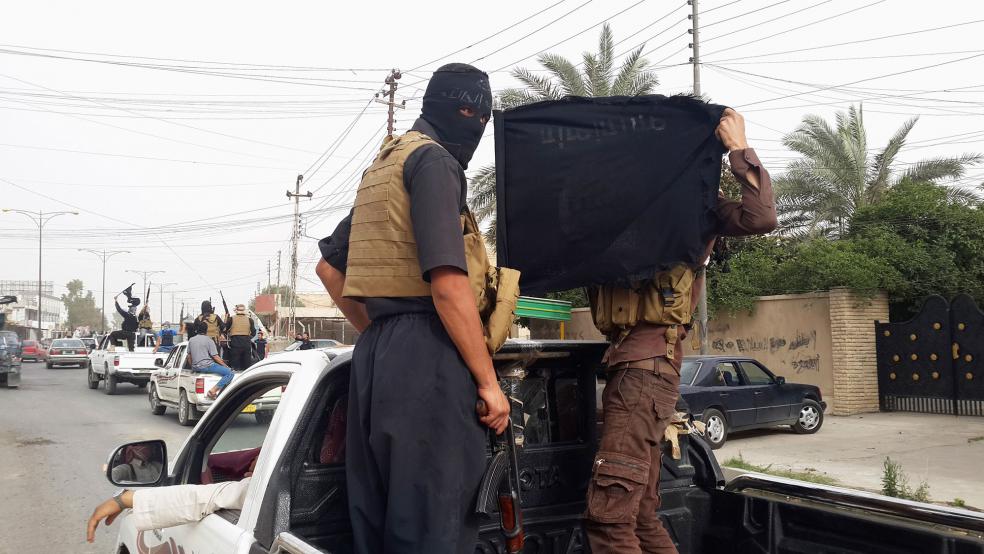While Congress appears on track to review and even block a final deal to prevent Tehran from developing a nuclear weapon, it now looks as if Republicans and Democrats have abandoned efforts to rewrite President Obama’s powers and timetable for waging war against ISIS terrorists in Iraq and Syria.
With both parties sharply divided over Obama’s February request for new three-year authority and relatively wide latitude to bomb and pursue ISIS forces, influential senators including Foreign Relations Committee Chair Bob Corker (R-TN) and Armed Services Chair John McCain (R-AZ) say it would be a waste of time to try to update the war powers that were granted President George W. Bush during the early 2000s.
Related: Why Congress Should Simply Bag the War Powers Debate
Corker said in an interview this week that even if lawmakers were somehow able to reach consensus on a new Authorization to Use Military Force (AUMF) for the president, “It’s not going to change anything on the ground one iota.”
“What the President sent over isn’t supported by any Democrats,” let alone Republicans, he added. “I think the world and our allies realize we are united against ISIS right now. What I don’t want to do is begin a process that in the end may show divisions.”
McCain, an ardent critic of Obama’s defense and foreign policy initiatives, told reporters, the bill is going nowhere according to Defense One.
At one time, it was almost inconceivable that Obama would have to go it alone in waging war on ISIS, in the wake of the jihadists’ high profile killings and beheadings. But now it seems almost a certainty that Congress will choose to take a back seat to the president in making the tough political decision of declaring new parameters for war in the Middle East.
Related: Why the Senate Is So Torn on Obama War Powers Request
Obama at first voiced skepticism that he would need additional authority from Congress to wage allied air strikes against ISIS and arm and train allied militants and rebels in Iraq and Syria to eventually topple ISIS. But he gave in after the Democrats lost the November election and then formally submitted a request for new authorization from the new Republican-controlled Congress.
The proposed war powers legislation submitted by Obama would impose a three-year limit on American action that has been conducted largely from the air and allow Special Operations endeavors and other limited missions. However, it would rule out sustained large-scale ground combat. It would also finally repeal the expansive 2002 congressional measure authorizing the Bush administration’s war in Iraq.
The proposed three-year expiration date for the authority and the prohibition against the “enduring” use of U.S. ground combat troops are sticking points with the Republicans. Defense hawks such as McCain, Sen. Lindsey Graham (R-SC) and House Armed Services Committee Chair Mac Thornberry (R-TX) think the presidential request falls far short of what’s needed to ultimately defeat ISIS and that the U.S. may eventually have to deploy ground troops in the Middle East.
Democrats, meanwhile, have complained that the language is too flexible and that Obama or a future president could lead the country deeper into a Middle East quagmire.
Related: How ISIS Regained Its Momentum in Iraq
There may be another factor at play as well: The situation in the Middle East is so complicated, bloody and intractable that most lawmakers would prefer to watch events unfold from afar. Many apparently don’t want to leave their finger prints on revised war powers legislation that could prove ineffective or detrimental to the U.S.-allied war effort against one of the most ruthless and dangerous Islamic groups of modern times.
The U.S. and its allies have had at best mixed success in loosening ISIS’s grip on strategic regions of Iraq and Syria using fighter jets and drones. This week the administration celebrated reports that ISIS’s supreme leader, Abu Bakr al-Baghdadi, was injured after a bombing raid in western Iraq and that he is no longer in day-to-day control of the terrorist organization.
Nonetheless, ISIS appears to be regaining its momentum and recapturing territory in Iraq. The terrorist organization wrested control of Iraq's largest oil refinery for a day and is threatening to take the city of Ramadi to the west of Baghdad. While the Defense Department reports that ISIS has lost a quarter of its controlled territories, the reality on the ground has changed in favor of ISIS more recently.
Related: Rare Bipartisanship Rules the Day on Iran Nukes Deal
Moreover, the administration’s extensive use of drones in combatting terrorism in the Middle East will undoubtedly come under renewed scrutiny after Obama on Thursday publicly apologized for the accidental killing of two hostages held by Al Qaeda –including an American– during a counter-terrorism drone operation in in Pakistan last January.
Warren Weinstein, an American held by Al Qaeda since 2011, and Giovanni Lo Porto, an Italian held since 2012, died during the drone operation.
Top Reads from The Fiscal Times





